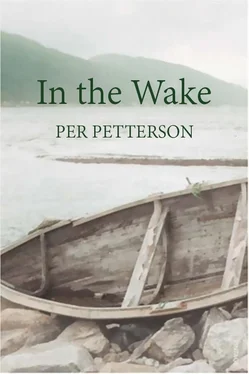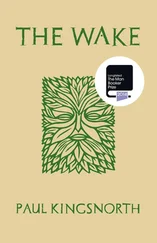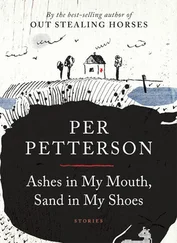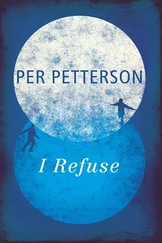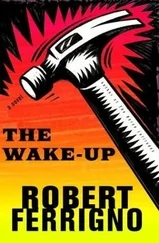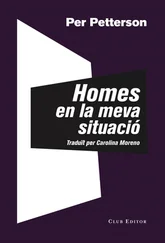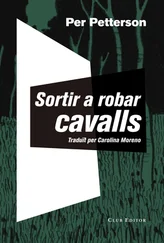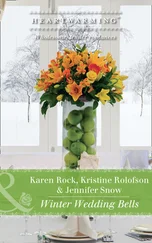“There you are at last,” he says, “come to visit your brother. So now there is no-one else, is there? Now we are a plenary session.” He laughs loudly.
“I was here last night,” I say.
“You were?”
“Yes.”
He falls silent, he leans against the wall and smiles, but he is not smiling at me or at anyone else that I can see, and then he laughs again and says: “I was just telling Randi about the time you and I went up to Aluns Lake to fish in the drinking water even though it was strictly forbidden, and we met the tramp who had moved into the forest to avoid all the shops that sold beer and all the wine monopolies so he couldn’t get drunk, and now in the evenings he just sat looking at the lake, scouting for beavers, and lived on canned food, and how he helped us reel in the big pike we took home with us later and did not dare show anyone because we had broken the law, and then we put it in the basement store, and there it lay until it went completely rotten and started to stink like hell.”
He takes a breath and goes on, and the thing is that nothing he says is true. It is something I once wrote in a novel mixed up with a story by Raymond Carver I know he has read, because I asked him to and we talked about it afterwards. It is only a year or two ago.
“Do you remember the smell of him?” my brother says. “Of bonfire and pine needles and marshes, and how we loved that smell, and how we wanted to live a life like his, but we were too young, weren’t we, and we had to go to school, and how that made us furious.” He smiles, what he says is just crap, and I cannot understand why he talks like this, for we never have shared such an experience, never shared those words, but I can clearly remember thinking like this when I was a teenager and have often done so since, and I never heard my brother say he had the same ideas. It was my secret, all that, and no-one knew a thing about it until I started to write about it many years later.
Randi bites her lip and looks at me to find out what to think about this stream of words, but I cannot help her and in fact do not want to, and then she steals a glance at her watch and says: “David has already been at home on his own for two hours, I’d better be going.”
David is their son, he is the same age as my older daughter, barring three days. When my brother hears his name he blinks several times and his face goes stiff. Randi does not see that, she bends down and gives him a quick hug. Then she stands up, and he is just as stiff.
“Take care,” she says, “see you tomorrow,” and walks down the corridor to the glass doors, and she is a stylish lady seen from behind, with brisk, determined steps on her way away from this place and maybe much further, maybe to a whole new life, and I stay on alone beside the bed with the vacant chair at my side. My brother stares at that chair.
“I am so tired,” he says, not raising his eyes. He lies down and pulls the duvet up to his chin, closes his eyes and opens them again and looks up at the ceiling, and I think of how I would like to know what he sees up there, and then I realise that it is not true. It is just something people say when they do not know what else to say.
People are walking along the corridor behind me, it is visiting time for others as well, and they laugh and talk loudly, and I turn and see they are correctly dressed in newly pressed civilian clothes, bringing flowers and chocolates, and even lousy novels in paperback editions under their arms. I stay twisted round in my chair staring after them, and I do not want to turn back. I have nothing to say. And then I say:
“So you thought you could just go off and leave me on my own, did you?”
The chocolates people are talking at the end of the corridor. Someone opens a door to another room and closes it again. There is someone crying in that room. Otherwise all is quiet. Maybe my brother has gone to sleep. I hope so. I look at him.
“You won’t do,” he says. His voice is completely empty, there is nothing there for me.
“OK,” I say.
“I want to sleep,” he says, turning his face to the wall.
“That’s OK.”
I sit on the chair looking at his back and the back of his head with the curly hair growing thinner. He has a bald patch now. I do not recall seeing that before.
“OK. So long,” I say.
“So long,” he says to the wall.
I get up and go. At the end of the corridor I stop and look back. A nurse comes along pushing a screen which she arranges in front of his bed.
I do not wait for the lift, but make for the stairs, and there are many floors, six or seven, or maybe eight, I seem to lose count, and I more or less run the whole way down, and it’s like sinking, and there is hardly anyone on those stairs. Only once there are two men coming slowly up, side by side, step by step, and they talk and look at each other, and I do not want to go round them, to change direction, it is too much trouble, so I aim right between them. There is really not enough room, so I snarl:
“Out of the fucking way,” and push the one to the left in the shoulder. He curses and I hear them stop and feel them staring at my back. But I do not stop.
On the ground floor, I stop running, but I still walk quickly, I can out-walk most people if I decide to, and through the big hall I slacken speed so much it almost looks normal. It is crowded with people and all the tables are taken. That is all right by me. I am on my way out.
It is raining in front of the hospital. The helicopter has gone. I run again, across the tarmac in the rain to the car park, and suddenly I forget where I left my car. I run up and down the rows. There are many more than when I arrived, several rows of brand new cars. How people can afford such new cars is more than I can grasp, fuck it all, I shout, fuck it all, where the fuck is my old car, and the rain pours down as if possessed, and it cannot go on like this. I can’t take it any more. I must get away, I must go somewhere new, see completely different things than this misery here, see some other country with different people. And then there it is, my white Mazda with a handsome scrape on the left front wing. I unlock the door and get in, hair and shoulders sopping wet, and picture sea voyages when boats were boats and not floating casinos, and they rolled with the waves as they were meant to do, with wind sweeping the decks, and all the places I would dream about were far, far away.
I WAS NINETEEN and came down to Gothenburg late at night from off the Europa road, and it was late September and the sky was dark above the big town. The lorry driver had shown me which way I should go and which sign to look for to get out along the lighted streets to the harbour area at the other end and further on all the way to where the boat for England was moored, and it was a long stretch, he said, and it certainly would be dark there and quite deserted, but I liked the walking, I had plenty of time, my boat did not leave until next morning. I had taken no chances and would not miss it. Now I had a night before me.
I had been up at dawn that morning to avoid disturbing my parents, and everything went well and quietly until I had to go into the living room to fetch something I had forgotten, and then my youngest brother sat on the stairs. He was seven years old and had very shiny, almost white hair, and he sat there in his pyjamas full of warm sleep, looking at me and waiting, and saying nothing. I really did not know him very well, I was twelve when he was born and had bought my first record player, and after that my eyes were looking in quite other directions than to the living room at home, but he was a good lad, and we were always very polite to each other. Now I went up and sat down on the same step.
Читать дальше
